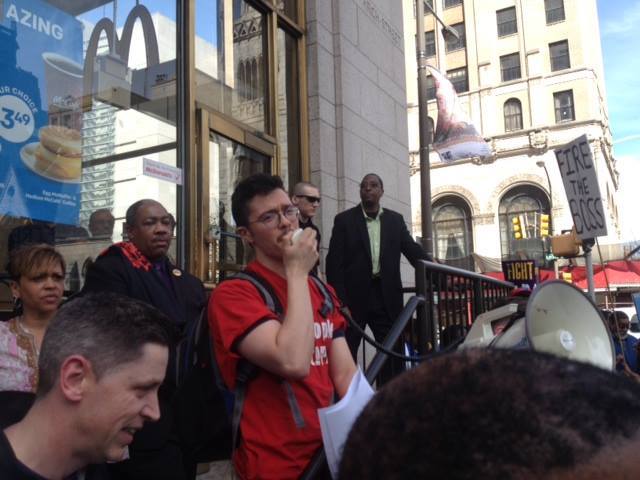by Karim Sariahmed
this piece was originally posted at In-Training.org
Almost every morning, one of our physiology lecturers asks a question. Usually, it’s a question to which most of my 200 classmates would know the answer. The silence lingers until finally they get a response, often whispered like an embarrassing secret by someone sitting near the front. The timid self-consciousness on display in this small ritual is a major part of the socialization that happens in medical school.
Sometimes, when I compare how I feel as a person outside school to the way I feel most days in class or the clinic, the prospect of community organizing in medical school seems like a losing battle. The community I work with in Philadelphia taught me to speak my mind compassionately, but without fear of my audience. Because of them, I don’t always wait for permission to speak. But at school, I often assimilate a meek deference to authority, even when people in positions of power say things which my own knowledge or experience would refute. These encounters will only become more frequent in my clinical years. Despite these dynamics, I think participation in grassroots movements from within or entirely outside of medicine can make us powerful.
The way that I’ve become powerful has a lot to do with commitment. A little over a year ago, I marched with Put People First PA (PPF-PA) at #ReclaimMLK in Philadelphia, a demonstration to recall Martin Luther King Jr.’s most important legacy: his lucid vision for dismantling racism, militarism and poverty. PPF-PA is a grassroots membership organization dedicated to meeting the needs of poor and working people by uniting across lines of division in our state. Our current campaign aims to make healthcare a human right in the state, as part of the larger Healthcare is a Human Right Collaborative. The foundation of our work is about changing what’s politically possible in the state by organizing people and creating deep connections across different communities surviving through the same crises of poverty.
Before marching with a few thousand others that day, our members got together to discuss what the action meant to us and why our work must not separate health care justice from the #BlackLivesMatter movement. Most importantly, we knew that the march, the way it made us feel and the way it brought us closer to each other, would carry forward into work on political education and leadership development in our own communities. This was one of the most meaningful actions I’ve ever participated in because it was with a community in which I had a stake. I work with these people not because it’s the logical community service correlate to a successful medical career, but because I want to live and work in a place where living with dignity is actually possible for everyone. The people who can make that happen are already here. The uninsured and under-insured all around us are already experts on our profit-hungry health care system, and there are a million ways to support their leadership while developing our own.
Knowing this, I am not waiting for something to happen. I am always thinking about what I can help make happen. With longstanding commitments to organizations like PPF-PA as a backdrop, I can always ask myself: is this work making my community more powerful? Is this work creating discrete opportunities for more people to participate in their own liberation, to become stronger leaders? This holds while I’m in medical school, it holds during election season, and it holds when, all of a sudden, the debate around healthcare has flared up to a national stage. I think we can do this long-term work with all kinds of communities, even from a position in medicine. The medical chain-of-command tries to convince us that we have no power, and that our values have no weight — but despite this, we need to actively practice using our voices. At no point will this health care system invite us or give us permission to do that, no matter how many degrees or accolades we might accumulate within it. It’s on us. By practicing being powerful, we will make real change happen, even while the system we work in tries to keep us cynical and self-conscious.
For me, Students for a National Health Program is an important vehicle for students to find our power, and we are already flexing our muscles. Recently, we kicked off our national Bird-Dogging Campaign in Philadelphia. We’re making candidates talk about single payer health care not only in the presidential election, but in state and local elections as well. Listen to my friend Emily talk about a recent action we took as part of the campaign:
For a few reasons, I do hope you’ll get involved with SNaHP’s campaign. First and foremost, we have an unprecedented opportunity to push the conversation on making our healthcare system truly “everybody in, nobody out.” Equally as important, I hope you’ll get involved because we will make each other more powerful. We’ll cheer you on the whole way, and whether or not we win in this particular moment, the process will help us speak together more meaningfully, and move together more powerfully. Making healthcare a human right will require a fundamentally different set of power relations. For that, we need an ambitious policy vision, but equally, we need to transform the way we think about ourselves, the people we care for and our collective power.
Whatever means you find for doing this work, it can be grounded in a long-term commitment to working alongside leaders in communities most affected by health inequity. When our greatest allies in transforming our healthcare system are those with the most to lose in it, we no longer need anybody else’s permission to speak. To win the world we want, where caring for each other is the means to its own end, we’ll need to get more powerful, and we’ll need to do that together.

